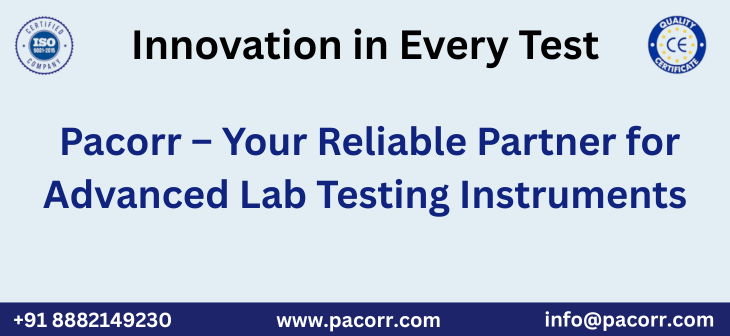
Pacorr is a trusted name in the field of material testing, offering an expansive range of high-precision instruments tailored for industrial quality control and product validation. Among the most utilized machines in mechanical testing environments are the tensile testing machine and the universal testing machine, each serving distinct yet occasionally overlapping purposes. Understanding the key differences between tensile testing machines and universal testing machines is essential for selecting the right equipment for specific testing applications. With increasing demands for product safety, structural performance, and regulatory compliance, having the right testing solution makes all the difference.
Overview of Tensile Testing Machines
A tensile testing machine is specifically designed to evaluate a material's behavior under uniaxial tensile stress. It applies a pulling force to a test specimen and measures the resistance of the material to elongation, ultimately determining its tensile strength, yield strength, modulus of elasticity, and elongation at break.
Pacorr’s tensile testing machines are equipped with advanced digital force gauges, extensometers, and programmable software that provide real-time monitoring and accurate data analysis. These systems are highly reliable for materials such as metals, plastics, rubbers, and textiles where tensile properties are crucial to performance.
Key Features of Tensile Testing Machines
- Designed specifically for uniaxial tension tests
- High-resolution load cells for force measurement
- Precision grips and fixtures for accurate specimen clamping
- Typically follows standards like ASTM D638 or ISO 527
- Often includes extensometers for strain measurement
Understanding the Universal Testing Machine
A universal testing machine (UTM) is a more versatile piece of equipment capable of performing a wide range of mechanical tests, including tensile, compression, flexural, peel, and shear tests. As the name implies, it is universal in its functionality and can be adapted for multiple testing scenarios through the use of various fixtures and software configurations.
Pacorr’s universal testing machines are engineered to deliver comprehensive mechanical testing capabilities. Their modular design allows for seamless transition between different test types without compromising on measurement accuracy or compliance with testing standards.
Key Features of Universal Testing Machines
- Suitable for tension, compression, flexure, and more
- Modular design with interchangeable fixtures
- Controlled via sophisticated software platforms
- Dual-column and single-column configurations available
- Supports a broader range of standards including ASTM, ISO, and BIS
Tensile vs Universal Testing Machines – Core Differences
While both machines can be used for tensile testing, there are several structural and functional differences that distinguish them.
1. Testing Scope and Capabilities
The tensile testing machine is purpose-built for tension testing. It is optimized for pulling applications, ensuring maximum accuracy and repeatability for this specific test.
In contrast, the universal testing machine is designed to handle not just tensile tests, but also compression, bending, shear, and other mechanical tests. This versatility makes it ideal for labs or production facilities that require multi-functional equipment.
2. Fixture Compatibility and Modularity
Tensile testing machines typically come with standard grips and are configured for quick setup of tension tests. While they may allow for limited fixture changes, they are not designed for broader mechanical test variations.
Universal testing machines, however, support a variety of grips, platens, extensometers, and test jigs. This modularity allows users to perform a wide range of material tests by simply changing the fixtures, all on the same platform.
3. Cost and Investment Consideration
A tensile testing machine is generally more affordable than a universal testing machine due to its focused design and limited application scope. It’s ideal for organizations that primarily perform tensile tests and want a dedicated solution.
A universal testing machine, being multifunctional, typically involves a higher initial investment. However, it offers greater value over time for businesses that conduct diverse tests across various material types.
4. Machine Design and Structure
Most tensile testing machines are single-purpose, with simpler controls and user interfaces focused solely on tensile property evaluation.
Universal testing machines are more complex in structure, featuring dual-columns for higher load testing or broader stroke ranges. They often include advanced automation and programmable test sequences for different materials and standards.
5. Application and Industry Use
Tensile testing machines are widely used in sectors such as textiles, polymers, packaging, and cables where tensile strength is a critical quality attribute.
Universal testing machines, on the other hand, are essential in industries like construction, automotive, aerospace, and research laboratories, where a variety of mechanical properties must be evaluated under different load conditions.
Choosing the Right Equipment for Your Needs
Selecting between a tensile testing machine and a universal testing machine depends entirely on the scope of your testing requirements. If your quality control processes revolve around uniaxial tension tests, investing in a Pacorr tensile testing machine is a cost-effective and efficient choice. However, if your operations demand a wider range of material evaluations, including bending, compression, and peel tests, a Pacorr universal testing machine offers the flexibility and robustness needed for comprehensive testing.
Performance and Accuracy with Pacorr Machines
Whether tensile-only or universal, all Pacorr machines share a common emphasis on:
- High precision sensors for accurate data capture
- Sturdy machine frames for minimal vibration and deflection
- Comprehensive software for real-time monitoring and result analysis
- Compliance with global testing standards for trustworthy reporting
- User-centric design for ease of operation and maintenance
Pacorr’s commitment to quality ensures that every machine delivers dependable performance, making it a trusted partner in the field of mechanical testing.
Standard Test Methods Supported
Both tensile and universal testing machines from Pacorr support a variety of international test standards, ensuring your lab meets regulatory and client expectations.
- ASTM D638 – Standard for plastic tensile tests
- ASTM E8 – Standard for metal tension tests
- ASTM D695 – Compression properties of plastics
- ISO 527 – Plastics tensile testing
- ISO 178 – Flexural testing of plastics
- BIS and other regional standards for diverse material types
Conclusion
Understanding the differences between a tensile testing machine and a universal testing machine is fundamental when planning a testing strategy or investing in new equipment. Each machine offers its own advantages based on the type of materials, testing scope, and budget constraints.
Pacorr, with its extensive experience in designing material testing machines, provides reliable, high-performance solutions for both specialized and multi-functional testing needs. By choosing the right equipment, companies can enhance their product quality, meet compliance demands, and achieve greater operational efficiency in their quality control processes.
Thanks to Pacorr Testing instruments, we have all the required quality testing instruments that have helped us to ensure the best quality delivered to our clients.

Danish
Fair Exports Pvt. Ltd.
